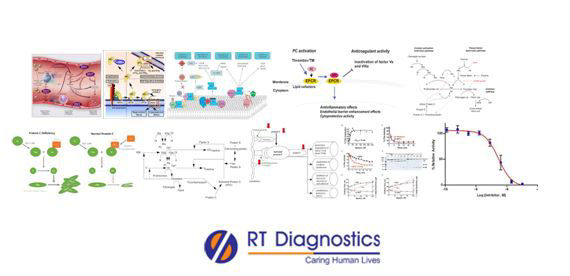Protein-C-Activity:
Why Protein-C Activity Test?
CLINICAL INFORMATION
Protein-C (PC) is also known as auto-pro-thrombin IIA and/or blood coagulation factor XIX). It was named Protein-C because it was the third protein (“Peak-C”) that eluted (separated and isolated) from ion-exchange chromatography. It is a vitamin-K dependent plasma glycoprotein, on activation functions as an anticoagulant by inactivating factors Va and VIIIa. Protein-C is a pro-enzyme (zymogen precursor) of serine protease synthesized by the liver which has multiple domains. Protein-C is homologous to factors VII, IX and X. The gene for Protein-C is located on the long arm of chromosome 2. Protein-C has an important role in the regulation of blood clots. Two types of congenital Protein-C deficiency are either due to a reduction in Protein-C deficiency/activity or because of dysfunctional Protein-C, thus resulting in a condition called as activated protein-C resistance. Other causes for reduced APC – activated protein-C include liver diseases, vitamin K deficiency, warfarin – oral anticoagulant therapy, severe infections, kidney diseases, cancers and certain chemotherapy, HIV, pregnancy etc. Hence these pathological conditions contribute in formation of frequent blood clots (thrombophilia) and thus these patients are to be monitored since they are at a very high risk of intravascular thrombus formation (thrombosis) leading to complications such as VTE (venous thrombo-embolism), DIC, DVT, pulmonary embolism, stroke, purpura fulminans, death of newborn (neonatal purpura in newborn babies could be a clinical manifestation for the deficiency of APC-Activated Protein-C) etc. Protein-C activity: Protein-C serine protease pro-enzyme is converted to activate form i.e activated protein-C (APC) by thrombin and thrombomodulin. Thus upon activation APC (activated protein-C) forms a complex with protein-S on a phospholipid surface and hence rapidly it inactivates blood clotting factors such as factor Va and factor VIIIa. Protein-C is activated when it binds to thrombin. Other factors that stimulate Protein-C activation are thrombomodulin, endothelial protein-C receptors (present in the blood vessels) etc. Activated Protein-C prevents coagulopathies. Activated protein-C (APC) other than regulating blood clotting, and apoptosis (programmed cell death), has Cytoprotective effects (anti-inflammatory effects on endothelial cells and leucocytes), and it is also involved in process inflammation, thus it has a modulatory role in inflammation (pro-inflammatory and anti-inflammatory actions. Hence about 20 genes are involved in the regulation of Protein-C activation (i.e up-regulation and down-regulation). Elevated levels of Activated protein-C are seen in conditions like increased hepatic insulin resistance in patients with diabetes and hypertriglyceridemia, nephrotic syndrome, with the use of anabolic steroids, oral contraceptives, alcohol and with increasing age. Hence this Activated protein-C test is a part of evaluation for the patients with coagulation disorders and thus it identifies the patients who are deficient in protein-C and/or S. The clinical significance of this test is that the deficiency of activated protein-C would result in the risk of clot formation since there is decreased or no inhibitory feedback on coagulation cascade by protein-C. Protein-C activity test: This test measures the activation and active site of the functional domains (clot based assay) of Protein-C. It is a clotting assay that uses a modified aPTT with a Protein-C activator (protac). Thus this test activates both Protein-C and factors of the intrinsic pathway. Since this test is highly sensitive, the possible errors in test results may either arise (because of many factors involved) due to the occurrence of an under-estimate value in some cases or in a few rare cases even the overexpression might be rarely projected occasionally. Moreover, other associated tests include Protein-C antigenic assay (which is not based on function or activity and helps to distinguish between type-1 and type-2 PC abnormalities) is performed by ELISA, radial immunodiffusion – RID etc. Therefore these test results are extremely helpful in certain blood clotting pathologies such as hyper-coagulable or consumptive states etc. Additional tests include chromogen (amidolytic) based assay – the formation of chromogenic colour is proportional to the amount of Activated protein-C – APC (hence Protein-C) in the plasma sample specimen (test results can be interfered with by hemolysis, lipemia, icterus etc), partially activated Protein-C test, antithrombin, lupus anticoagulant, antiphospholipid antibodies, factor V Leiden test, prothrombin test etc. Other tests include CBC, differential count, Peripheral blood smear test for platelets count and thrombocyte activity tests, D-dimer, homocysteine etc.

General Instructions:
Sample Requirement: Specimen - Blood sample collected from the vein. Test Preparation: None.
NOTE - Sample for specimen collections may vary based on the patient’s condition/cases according to the patient’s presenting complaints/signs or symptoms:
SPECIMEN REQUIREMENT (Special or Rare Cases) - As instructed and guided by Physician / Clinician / Pathologist / as per Laboratory’s requirements, according to procedures and protocols.
This Multi-Specialty Clinical Referral Laboratory RT DIAGNOSTICS provides precise and accurate tests with an extensive range of testing services to the medical centres to help in the diagnosis and identification of pathology in the test specimens for infectious diseases and also to evaluate the function of organ systems of the patient. It prevents further complications and helps to stabilize and restore health to near normalcy at the earliest without delay.



